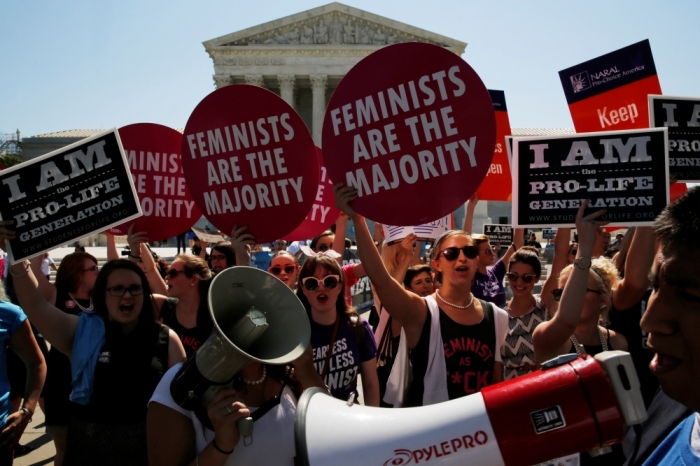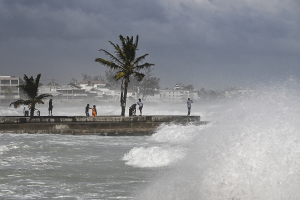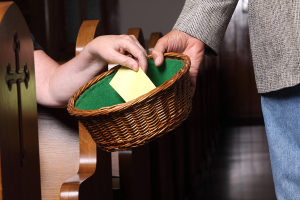White Evangelicals twice as likely as other groups to support bans on abortion: Pew

A new poll reveals that white Evangelicals are twice as likely as other religious groups to support the overturning of Roe v. Wade, which looks increasingly likely following the leak of a draft United States Supreme Court opinion in a case surrounding Mississippi’s 15-week abortion ban.
Pew Research Center released the results of a survey examining Americans’ attitudes on abortion Friday, four days after Politico published a draft majority opinion in the case of Dobbs v. Jackson Women’s Health. The draft opinion, authored by Supreme Court Justice Samuel Alito, indicates that a majority of justices have found that Roe v. Wade, the 1973 Supreme Court decision that legalized abortion nationwide, was “egregiously wrong” and “must be overruled.”
Pew conducted the survey from March 7–13, three months after oral arguments in the Dobbs case had concluded and about a month after Alito authored the draft opinion in the case centered on Mississippi’s 15-week abortion ban. The survey found that overall, 8% of Americans believe that abortion should be illegal in all cases with no exceptions, while 19% of Americans thought the killing of preborn babies should be legal in all circumstances with no exceptions.
Broken down by religious demographic, the results revealed that 21% of white Evangelicals wanted to completely ban abortion while 5% expressed a desire for abortion to be legal in all cases. Among Catholics, 13% indicated support for legal abortion in all cases compared to 10% who wanted a complete ban. Black Protestants supporting legal abortion with no exceptions outnumbered those who wanted to ban abortion with no exceptions by 20% to 7%.
Thirteen percent of white mainline Protestants reported support for legal abortion without exceptions compared to 6% who wanted a complete ban. The gap between those who want abortion to be legal in all circumstances and those who want a total ban on the procedure was highest among the religiously unaffiliated, with 34% indicating support for the former position and 2% agreeing with the latter.
A majority of white Evangelicals (53%) think that abortion should be illegal in most cases, along with 32% of Catholics, 31% of white mainline Protestants, 21% of black Protestants and 13% of the religiously unaffiliated. A majority of the religiously unaffiliated (51%) believe that abortion should be legal in most cases, along with pluralities of white mainline Protestants (47%), black Protestants (46%) and Catholics (43%). Just 19% of white Evangelicals told Pew that they wanted abortion to remain “mostly legal.”
Members of each religious demographic surveyed elaborated on what specific exceptions to abortion bans they favored. Majorities of all religious subgroups agreed with a statement declaring that “abortion should be legal if pregnancy threatens women’s life/health.” The religiously unaffiliated demonstrated the highest support for allowing abortion if a woman’s life or health is in danger at 87%, followed by 77% of white mainline Protestants, 71% of black Protestants, 69% of Catholics and 51% of white Evangelicals.
An equal share of religiously unaffiliated Americans (87%) reported that abortion should be legal if the pregnancy resulted from rape, while support for the rape exception was lower among white mainline Protestants (75%), black Protestants (71%), Catholics (66%) and white Evangelicals (40%). At least half of all religious subgroups maintained that “how long a woman has been pregnant” should “matter in determining whether it is legal or illegal to have an abortion.”
White mainline Protestants (64%) and Catholics (63%) were the most likely to agree with the aforementioned statement, while smaller shares of white Evangelicals (56%), black Protestants (50%) and the religiously unaffiliated (50%) did. When asked if their religious views were “extremely or very important” in shaping their position on abortion, 73% of white Evangelicals answered in the affirmative.
By contrast, 51% of black Protestants, 41% of Catholics, 28% of white mainline Protestants and 7% of the religiously unaffiliated cited their religious beliefs as “extremely or very important” in influencing their views on abortion.
Overall, 36% of Americans believe that abortion should be “legal in most cases.” Twenty-seven percent think the procedure should be “illegal in most cases,” 19% want to see abortion “legal in all cases” with no exceptions, 8% said that abortion should be “illegal in all cases” with no exceptions, 6% wish to see abortion “legal in all cases” with “some exceptions when abortion should be against the law,” and 2% expressed support for the idea of making abortion “illegal in all cases” with “some exceptions when abortion should be legal.”
Support for legal abortion among the American public as a whole decreases the further a woman gets into her pregnancy. Pew asked the 71% of respondents who think abortion should be “legal in some cases/illegal in some cases” whether they supported legal abortion at six weeks, 14 weeks and 24 weeks gestation.
Including the 19% of respondents who think abortion should be legal in all cases and the 8% who believe abortion should be illegal in all cases, support for legal abortion drops from 44% at six weeks to 34% at 14 weeks and 3% at 24 weeks. At the same time, support for keeping abortion illegal rises from 20% at six weeks to 27% at 14 weeks and 54% at 24 weeks.
Should the Supreme Court overturn Roe v. Wade as expected, the states will be responsible for determining their abortion laws. Twenty-one states will restrict abortions to either the first six weeks of pregnancy or completely ban the procedure, 16 states will continue to permit abortions as the right to abortion has been codified into state law, 10 states will continue to enforce existing abortion laws, and three states might soon have referendums where voters will have the opportunity to amend or affirm existing abortion laws.
Ryan Foley is a reporter for The Christian Post. He can be reached at: ryan.foley@christianpost.com




























